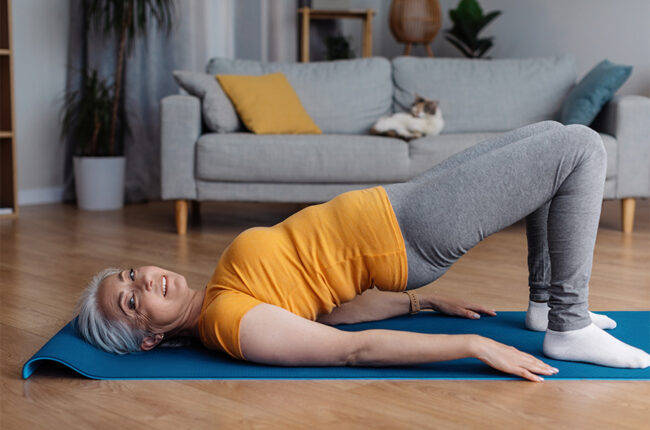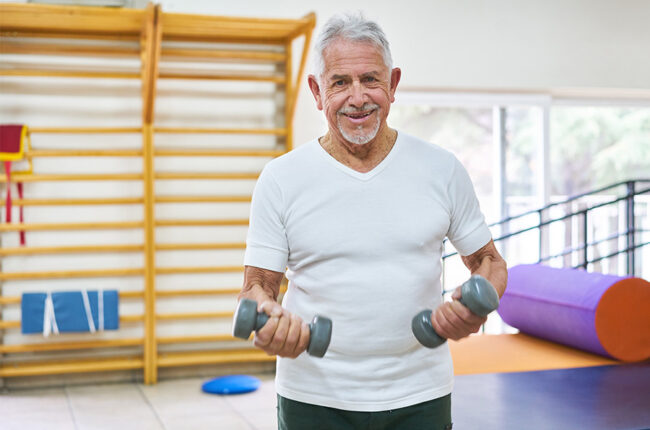Your small, daily habits add up to larger lifestyle choices that influence your health. It’s important to take stock of your daily habits and evaluate where you have room to grow. We’ve compiled a “what’s in and out” list to help you think through areas where it’s common to struggle with unhealthy behaviors. Check out these simple yet effective ways to replace these habits with healthier alternatives.
In: Good sleep
Out: Stress and sleep deprivation
Sleep plays a pivotal role in so many aspects of our health, from keeping our minds strong to warding off illness and disease. Unfortunately, many people fail to get the sleep they need, and an estimated 50 to 70 million people in the U.S. have a sleep disorder. Adults should get between seven and nine hours of sleep each night — and the quality of that sleep is crucial. Here are three relaxation techniques to help you fall asleep!
In: Pleasure Reading
Out: Binge-watching and doom-scrolling
In a sea of streaming video and ever-present screens, doom-scrolling and binge-watching are often the entertainment of choice above the more old-school option of reading a book. But research says reading can provide a healthy distraction from life’s day-to-day worries and pressures while also making us smarter, happier, and even more empathetic toward others. Audiobooks are an excellent way to read while engaging in physical activities like walking or exercising. There are free audiobook resources available, such as Librivox, OverDrive, and Audible‘s free trial, which offer a wide range of titles to choose from without any cost.
In: Homemade meals
Out: Eating out and ordering in
People are looking for fast and tasty foods to fit busy lifestyles. But whether you’re eating carryout or sit-down restaurant cuisine, researchers say you’ll consume about 200 more calories a day and more saturated fat, cholesterol, and sodium than if you made your meals. Cooking at home, however, helps you avoid these pitfalls and is an opportunity for creativity, togetherness, and cost-cutting.
Looking to improve your cooking skills? Need recipe ideas that are not only healthy but also affordable and simple to make? The VEBA Resource Center offers free in-person and virtual cooking classes to learn how to cook meals from our extensive recipe library.
In: Saying no
Out: Always hustling
Sometimes, your body, mind, or heart sends a message that it needs time off. It’s important to heed that call, especially if it’s coming from all three at once. Occasionally saying no to an invite, request or assignment is a true form of self-care, which can lead to reduced stress; improved mood, immunity, and self-esteem; and a variety of other physical, mental, and emotional health benefits.
In: Sober curiosity
Out: Regularly drinking
According to the U.S. Department of Health and Human Services, drinking can take a serious toll on your body. Limiting how much you drink or taking a complete break from drinking, what some refer to as being “sober curious,” can help boost your immunity, limit your risk of disease, lead to weight loss, and improve your sleep, concentration, energy, performance, skin health, and even your relationships.
In: Hygge
Out: FOMO
Everyone occasionally experiences FOMO, or the fear of missing out, but going to every social event can be exhausting and expensive and can lead to overindulgence in food and alcohol. Instead, consider enjoying more “hygge,” a concept originating in Denmark and Norway, which means to take time away from the daily rush to be together with people you care about — or even by yourself — to relax and enjoy life’s quieter pleasures.”
California Schools VEBA’s Self-Regulation Toolkit is a great starting point with daily 5-minute activities that will help you use your time more mindfully!
In: Digital detox
Out: Endless screen time
On average, Americans spend more than seven hours looking at a screen. And most use their smartphones for over three and a half hours every day — not counting when they’re talking to someone. All this screen time can have negative effects on your health, both physical and mental, which is why experts recommend no more than two hours of screen time per day. Here are some tips to regulate phone use more healthily.
In: Authentic friendships
Out: Accumulating social media “friends”
Friendship is good for your health. When you’re with friends, your body releases the hormone oxytocin, which combats stress and creates calm. And the more time spent with friends, the less likely you are to develop health issues and dementia. But creating and sustaining friendships takes commitment far beyond “liking” the occasional post. One study found it takes hundreds of hours — all worth it — to become true friends.
In: Movement every day
Out: Overexercising
The CDC recommends adults get at least two and a half hours of moderate-intensity activity each week. However, you don’t need to spend hours in the gym to meet this goal. Thirty minutes a day, just five days a week will do the trick. Pushing your limits can lead to poor performance and health problems, including overuse and stress injuries, too much weight loss, and decreased immune performance.
VEBA members can sign up for live classes, in-person and virtually, available seven days a week! There’s also a video library of on-demand classes you can access anytime, anywhere.
In: Water
Out: Caffeine-laden energy drinks
Water is an ideal choice for hydration. While some people prefer sports drinks over water because of the taste and added electrolytes, the standard sports drink contains 140 calories, 34 grams of added sugar, and 270 milligrams of sodium. Additionally, excess caffeine can be harmful, causing changes in heart rate, increased blood pressure, anxiety, sleep and digestive issues, headaches, and dehydration.
Embracing changes like these will have a profound and positive impact on your overall well-being in the long term. Now, what’s on your list? If you’re unsure where to start, California Schools VEBA has developed a library of downloadable resources to equip you with the support you need to navigate your health and well-being journey. As they say, out with the old, in with the new!
Thank you to our content partners at Sharp HealthCare.









